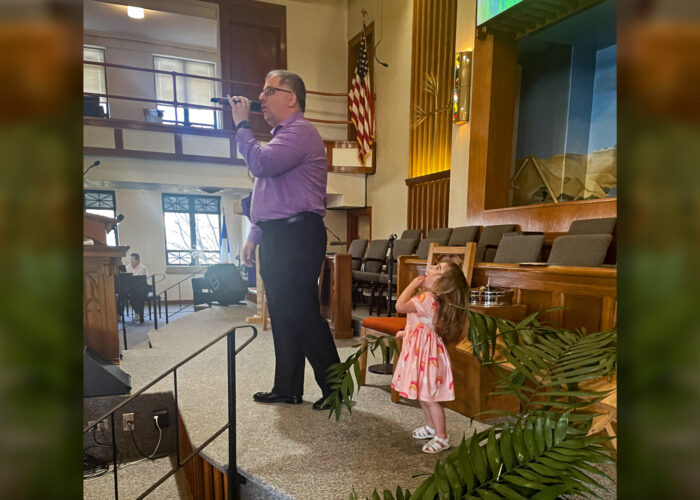Stories … everybody has one. And everybody’s shoes have a story. One of my favorite ice-breaker discussion prompts to ask a group of people that are convening for the first time is: “Tell me about your shoes.” Where did they come from? Where have you worn them? Why do you keep them? These questions have prompted some of the most interesting, hilarious and introspective answers that no other question has been able to repeat.
So in the spirit of that question, I’m going to tell you about the shoes I’ve been wearing in Chicago.
They’re called Sambas. I bought my first pair of Sambas when I was a freshman in high school because, I’m incredibly embarrassed to admit, it was the hip and unofficial footwear of the Eaton Rapids Greyhound Marching Band, a group of which I was far too proud to be a part of. Adidas originally designed Sambas to be a soccer shoe, so why a bunch of band geeks like us claimed that shoe as our own, I don’t know. But we did. So I got some, even though I secretly thought they were a little ugly.
They quickly became my favorite pair of shoes to wear, though. Not just because everybody else had them, but because they were, in fact, really comfortable! They are wide, have nice tall arches and are appropriate footwear for almost any kind of weather or activity. I proudly wore my Sambas all through high school and throughout college; they just fit.
So, of course, they were shoes that I absolutely had to bring with me when I moved to Chicago in August.
By that time, though, my Sambas that I bought before going to college were starting to look a little worse for wear. I didn’t care. I wore them everywhere. I do a lot of walking in Chicago since I don’t have my car, and I’m totally dependent on the Chicago Transit Authority, so they quickly began to deteriorate. The sole of the right shoe began to become detached from the rest of the shoe.
This did not stop me from wearing my beloved shoes. Likewise, however, my will to wear my shoes did not stop the sole from continuing its detachment process. In fact, when I wear it, it’s almost like I’m wearing a flip-flop. With every step I take, I feel and hear a sort-of popping noise as the rubber of the sole comes to meet the rest of the shoe. Sometimes, depending on how fast I’m walking, it even drags on the ground. I’m being irrationally stubborn about these shoes, though. I’ve kept wearing them.
A few weeks ago, I was on my way home from the store.
I was sitting on the red line train that services both the north and south side of the city, both the “have’s” and the “have-not’s.” (One thing that I love about using public transit is that it doesn’t discriminate; anybody who can afford the $2 ticket can ride the El.)
I got on the train, my right Samba faithfully flopping on my every step. I take a seat and see something that catches my eye … another pair of Sambas! If I thought my Sambas were in rough shape, they were nothing compared to the ones I was looking at now; these Sambas were very dirty and falling apart worse than mine. I look up and meet the eyes of the owner of these shoes, and immediately feel something in my gut that tells me this middle-aged man sitting across from me has seen far more difficult times than I have. His jeans are torn in several places, as is the coat he has on, and his unshaven and dirty face is framed by a hat far too big for his head. We hold each other’s gaze for a moment.“
Nice shoes,” he says with a relative toothless smile.
“Yeah, you, too,” I respond with a nervous laugh. We exchange awkward, crooked grins for a moment.
“I see yours’ve got a flop to ‘em,” he says.
“They do, yes,” I say.
“Not as floppy as mine, though,” he says, and reaches down and practically pulls the shoe totally in half from the back of his heal.
“Wow, yeah, those look pretty floppy.” Wow, that was a terrible response, I think in my head. This man has obviously seen some rough days and here I am just further affirming that point by calling his shoes floppy. OK, quick, think of something else to say.
“Mine have lasted me a long time, though! They’re pretty faithful footwear!”
“Oh, they sure are! I’ve had these as long as I’ve been on the streets. Almost three years. They hangin’ in there, though.”
The train began to slow down as it approached the next stop. “You have a nice evenin’, young ma’am,” he says. He got up and I hear the familiar flopping noise coming from his Sambas as he walks off the train. As the train pulls away from the stop, I feel something uncomfortable beginning to set in my stomach that makes me feel anxious and queasy. I experience this feeling daily, living and working on the west side of Chicago. You would think I’d be used to it by now, but it still catches me off guard every time.
It’s a feeling that is sometimes so uncomfortable I want it to go away, but in time have come to accept it as a very real and very valid response to what I see every day. In a weird way, it reminds me of this crazy call I accepted when I said yes to serving with DOOR and no to a “real adult job.”
If I’m being completely honest with you all, I wasn’t really all that thrilled to go to Chicago. I knew in my heart it was God’s call for the next season of my life, but I wasn’t super excited to act on it. And I’ve got to believe that Samuel was feeling the same way.
Many of us know and have heard the story of Samuel, and very easily get captivated by it … for good reasons, too! Wouldn’t we love to have a similar experience of God so clearly telling us what it is we’re supposed to do with our lives? When we read this story, I think we want to combine Samuel’s call and Eli’s response (“It is the Lord; let him do what seems good to him.”) as one singular set that we oversimplify and romanticize. “Here I am, Lord!”In reality, though, when that rubber hits the road, we don’t get far. It runs up against all these other forces in our lives that consume us and lead us to think, “I don’t have time for that.” “I don’t have the skills for that.” “I would have too much at stake to pursue that.” Or, one that I’m especially familiar with: “I’m going to be downright uncomfortable doing that.” So we walk away, disappointed in ourselves for not following through, and at some point, the cycle repeats itself.
If we separate Samuel’s and Eli’s points of view of this story, we find that there is actually quite a bit of tension between them that our “romanticized” version of this story doesn’t like to admit. Thinking about what Samuel was actually called to do—tell Eli that his family was about to be destroyed—perhaps isn’t a call that we’d like to take on. Or Eli’s response to what the near future is going to look like for those whom he loves isn’t exactly the response we would be likely to emulate.
Do you feel that tension? The tension between what we want the story to be and what the story actually is? The tension between Samuel’s call and Eli’s response? Does it feel familiar? It does for me. I feel tension between so desperately wanting to hear God’s call for my life and eagerly responding, and then my actual response isn’t a tension I’m proud to live into.
Knowing that tension exists, how do we honestly expect ourselves to respond in the way we truly want to when those calls come in? God’s call is supposed to feel uncomfortable and tense. A trusted college friend of mine once told me that if God calls us to do things God knew we would be comfortable doing, we would never grow. We would never learn. We would never push ourselves. We would just remain stagnant. God designed us to stretch. If we are created to have this desire to be stretched and to be pushed further, but are never challenged to do so, we would end up in this permanent internal stalemate, constantly in conflict with our desire to grow, but no means to do so.
Knowing that God calls us into that tension to do things we’re not comfortable doing isn’t an easy thing to accept. It doesn’t take much to throw in the towel out of confusion that a God who truly and authentically loves us would want those often painful growing experiences for us. Moving away. Losing a job. Mourning a loss. Being overwhelmed by the new and uncertain. The list goes on.
This is the moment that we have to make a choice. The choice to abandon ship, or the choice to believe that through all things, God is still with us as we answer that call; God has gone ahead of us, Christ walks next us, and the Spirit is moving through us into the new and the uncomfortable.
Friends, we worship a God who does call us to do uncomfortable things and go to uncomfortable places. But that same God who calls you to do those things you don’t want to do, to go to the places you don’t want to go, to speak to those people you don’t want to have anything to do with, promises to go with you.
What a humble honor and a high calling, that the God who created us loves us enough to provide us with opportunities to live into that tension with a more sure and steadfast walk of faith, saying, “Never will I leave you, never will I forsake you.” Every time that truth hits me, it stops me dead in my tracks … especially when I feel the rubber of my Samba flop against my right heel.
I could buy a new pair of Sambas. I live on a very simple and modest stipend, but I could still go purchase some shoes that didn’t feel like flip-flops. But I choose not to. Every time I wear my Sambas and feel that flop, I think of my friend I met on the red line. I think of how many others have a similar story to him that live in Chicago. I remember that crazy, uncomfortable call I have not just to be a DOOR Dweller, but to be a member of the body of Christ. Most importantly, when the rubber of my shoe meets my sole, I am reminded that God has promised to go with all those who have chosen to answer that high call, and will guide our feet on every step of the journey, so that we may faithfully and confidently say …
“Where can I go from your Spirit, where can I flee from your presence? If I go to the heavens, you are there; if I make my bed in the depths, you are there. If I rise on the wings of the dawn, if I settle on the far side of the sea, even there your hand will guide me, your right hand will hold me fast.”
Thanks be to God for the call to live in tension, for the courage to follow that call, and the promise that the Holy Spirit goes with us.
Let all God’s people say, “Amen!”
This blog post was originally written as a sermon for the First Presbyterian Church of Holt, Michigan, on the text 1 Samuel 3:1. Click here for an unabridged audio version.





